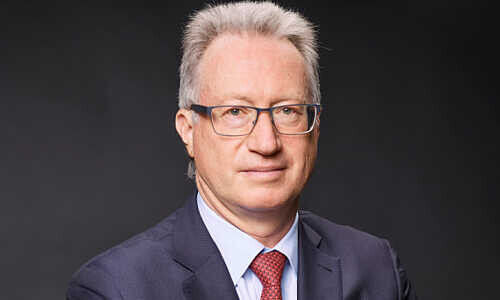Mirabaud put clients' interests ahead of revenue, senior partner Yves Mirabaud told finews.com. This year, the Genevan private bank is due to decide on a new technology platform.
Yves Mirabaud, your bank's financial results for 2020 look disappointing at first glance – profit dropped sharply.
This observation may seem accurate compared to 2019 and 2018, which were both marked by extraordinary revenue. We count 2020 – which given the circumstances around Covid-19 call for humility – as one of the five best years in our 200-year history with very pleasing results. A return on equity of 15 percent is estimable.
Nevertheless, revenue fell eight percent – in a year where clients and investors were quite active.
The fall is influenced by several factors. Our interest business felt the U.S. dollar's weakness. As for our commission and trading income, we started securing our actively managed client portfolios in March before the financial market turbulence.
«Clients didn't complain»
As a result, roughly 60 percent of our clients were passively invested during this extremely active phase in the market – by which I mean both the drop in markets as well as the recovery, because they were still invested. For our clients and the performance of their portfolios, this was favorable – less so for Mirabaud's revenue.
If you look at some of your peers which benefited greatly from the trading boom, was the hedging strategy the right one?
Yes, it was. We may seem old-fashioned and conservative, but our culture is not to aggressively be out in the market. We didn't receive any complaints from our clients. Their portfolios saw less volatility, clients didn't lose much sleep as a result, and performance was favorable in nearly all cases.
So you did have some outliers?
We did in fact. Two to three key clients which only use Mirabaud for execution. That means, we enact or enable what the client asks for. These clients had some major leverage in their portfolios and we called some margin during the market turmoil. Their positions suffered in the wake of this – which then hit revenue.
How do you view the 810 million francs in net new money compared to peers?
We had two diverging developments: we won many new wealth management clients who were looking for haven in Switzerland. In asset management, many investors were forced to reposition and we saw fairly strong outflows in the first six months of 2020.
«Covid-19 led to direct savings»
The second half of the year turned that upside down: strong net new money in asset management while private banking growth stagnated. The situation around Covid-19 with limited travel or possibilities to interact in person took a toll.
It seems on Mirabaud's spending as well – down sharply from 2019. Are you cutting costs?
No absolutely not but we were cautious in our spending. Covid-19 led to direct savings in areas like sponsoring events, and of course travel and entertainment.
How about your headcount?
We won several private bankers to strengthen our business in the seven markets we're active in. Because we retreated a bit in equities brokerage, we had some exits. We built up staff in Paris in Zurich for corporate finance, which are supporting advisory in private banking with mergers and acquisition and private equity expertise. We had a few new deals come through this pipeline already.
Do you plan to keep hiring in corporate finance?
The unit is still young and we want to take it step-by-step. We would have to justify adding people with new business. But where we do want to be active this year is in a real estate private equity fund. We've gathered $1 billion already and plan further transactions in the U.S.
What about hiring private bankers?
We'll continue with our strategy of reinforcing local offices in Switzerland, Europe, Latin America, and the Middle East; that should mean 15 to 20 new client advisers this year. We don't necessarily want to compete in acquiring big teams.
«We can't and don't want to compete in recruiting big teams»
We've observed a trend of advisers moving on after two or three years – we can't and don't want to be able to afford that.
Where do you want to keep investing – in geographically expanding?
We have no current plans to do so. We'd prefer to consolidate our business in the Middle East and Latin America after our recent expansion there. We've nearly reached break-even in the Middle East, and we're on our way to it in Brazil and Uruguay. Our investment focus is more technology-this year.
What do you plan in terms of technology?
We've reached the limits of a propriety technology platform we've spent nearly three decades developing. We're evaluating a new core banking system.
Avaloq or Temenos?
We're currently in an evaluation process. The two you mention are favorites.
You've gone this entire interview without mentioning ESG, which happens quite rarely in wealth management...
That's because our involvement with ESG already is fairly strong and we plan to continue to advise it. I'm frustrated sometimes that when it comes to climate change, the banking industry is viewed as a cause and a problem. I am convinced that banks are part of the solution. It is up to us bank to steer investor money towards new technology which can mitigate the effect of climate change. We are perfectly placed to do so and can play an important role here.
Yves Mirabaud has been senior partner of Mirabaud, a Genevan wealth manager founded by his family, since 2012. Mirabaud managed 34.9 billion Swiss francs ($37 billion) at the end of last year. Yves Mirabaud, who studied international relations in Geneva, joined the bank in 1993 and became a managing partner three years later. The Swiss banker began his career at various firms in Geneva, Zurich, New York, and Boston.


































